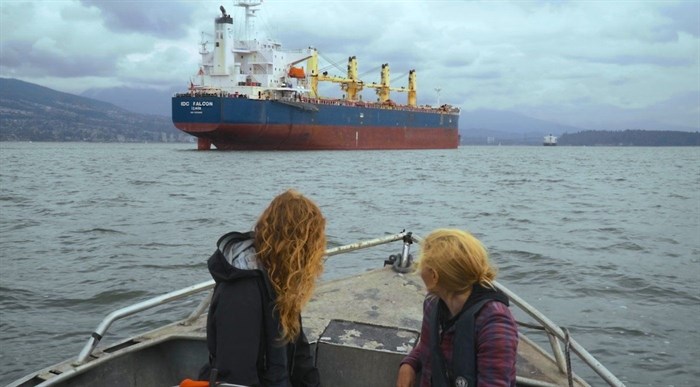
Filmmakers Gloria Pancrazi and Elena Jean explore the threats faced by endangered southern resident killer whales in their documentary Coextinction screening at the Vancouver International Film Festival on Oct. 3, 2021.
Image Credit: SUBMITTED/Coextinction
September 29, 2021 - 7:00 PM
The riveting heartbreak of an endangered orca that carried her dead calf for 17 days and more than 1,500 kilometres in B.C. waters in July 2018 captured the world’s attention.
The extended mourning of the mother orca, J35, also known as Tahlequah, illustrated endangered southern resident killer whales are at a dangerous tipping point, and further catalyzed two young filmmakers to explore what is necessary to save the iconic orcas, which frequent the Salish Sea along the U.S. and Canadian coast.
The documentary, Coextinction, was conceived with that one question in mind, said co-directors Gloria Pancrazi and Elena Jean, who spoke from the Jackson Wild film festival in the U.S., where their film is nominated for an award and will premiere on Wednesday.
But unravelling the question led the two young conservationists on an expansive journey from the north edge of Vancouver Island to Oregon’s Lower Snake River where the filmmakers engaged with scientists, activists, and Indigenous leaders to better understand the threats and solutions for the remaining southern resident orcas — of which a mere 73 still exist in the wild.
The documentary demonstrates the interconnectedness of the southern residents’ plight with pressing environmental threats, said Pancrazi, adding bold measures are necessary to save the orcas so integral to the Pacific coast and bound to the people who live there.
“I really think this film can help bring about change,” Pancrazi said.
“It’s not just about telling the orcas’ story, but to look at the bigger picture and the intersectionality of the issues.
“I think that's what's going to save them. And not just them, but us as well.”
The southern residents, which rely on equally endangered chinook salmon for 80 per cent of their diet, are a metaphor for the collapse of biodiverse ecosystems worldwide, Jean said.
“They represent so much beauty on the coast and beyond, and are such a powerful, poignant message that we really believe ... the world needs to hear and feel today.”
Coextinction, set to premiere in Canada at the Vancouver International Film Festival (VIFF) on Oct. 3, shows how the orcas’ peril is tied to the collapse of wild salmon populations and injustice against Indigenous peoples who have been displaced as environmental stewards — and how all three are under threat from society’s dependence on fossil fuels, hydroelectric energy, and fish farming.
The film examines the fallout effects from the way colonial society builds and interacts with the natural world while the original caretakers of the land and waters must struggle against systems that continue to suppress their rights, the filmmakers noted.
There’s a strong message of Indigenous allyship in the film, Jean said, adding relying on Indigenous guidance to solve ecological issues is key.
“The film shows specific examples of the systemic indigenous suppression,” she said.
“How industry has come in and done whatever they wanted to some degree on the coast, and (how) that has oppressed both people and the planet.”
The directors are excited about the film’s VIFF screening as much of the film centres on the B.C. coast and the preservation of killer whales is so important to coastal residents. But the topic will resonate with any community or nation struggling with the implications of climate change or threatened wildlife, they said.
“It is a West Coast-driven story, but it's a story that is being replicated everywhere in the world,” Jean said.
There is still time to act to save the resident orcas, said Pancrazi, adding the recent loss of an important matriarch is somewhat tempered by the good news that three of the endangered killer whales may be pregnant.
But the survival rate for baby orcas in their first year is still about 50 per cent, she said, and the population is still being threatened by the human-created environmental pressures.
“It's a very stark reminder that we need to take action,” Pancrazi said.
“These orcas are culturally distinct from other populations, and so incredible, intelligent and interesting.”
Humans can learn a lot from the whales in terms of co-operation and caring for one another, she added.
“There's just so many reasons why we need to make sure that they stay in this world.”
— This story was originally published by the National Observer.Rochelle Baker, Local Journalism Initiative
News from © iNFOnews, 2021